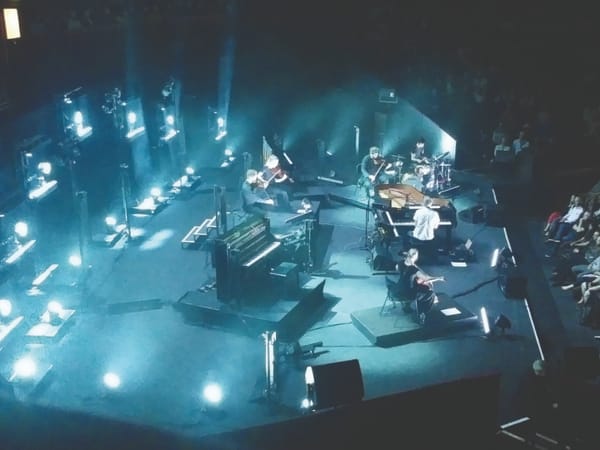Beach House return with lucky number 7
The dream-pop band’s latest work sees them developing their sound, embracing a more aggressive palette, while retaining their charm.

When the new Beach House album, 7, came out on Friday, the first thing I did in the morning was take a walk through Hyde park and listen to it. Back home, Beach house was THE band I would listen to on long and moody walks through the forest, and I thought it fitting that I give 7 a whirl in the closest approximation to a forest I have here. Listening to the band in nature just fits. Watching the leaves swivel in the wind helps internalize the poignant lyrics and the hazy sounds with which Beach House have become synonymous. The weather was overcast and the wind was blowing – everything was perfect.
Now, I have to admit that I hadn’t been convinced entirely by the singles leading up to the album. ‘Lemon Glow’ had all the right characteristics of a great Beach House song: the slow synth intro, subtle and intimate lyrics, and the characteristically soothing delivery of singer Victoria Legrand, arguably the best vocalist in dream pop. But the next two – ‘Dive’ and ‘Dark Spring’ – seemed like they signalled a slight departure from the sound I have come to know and love. ‘Dive’ seems to me to be one of the most aggressive sounding Beach House songs yet. Alex Scally’s guitar has a surprising fuzz and an edge to it and the final flourish kicks the drum machine into overdrive. ‘Dark Spring’ did not make sense at first either. Their songs usually tend to envelop your soul, to attempt to slowly coax you to resonate with their melancholy. Their practice space is entirely coated in white fur for fuck’s sake, you can’t expect this band to force any feelings on you. But that is how I felt about what would turn out to be the album opener – it felt forced.
Over the zebra crossing I went, and into the park; I started listening. Oh boy, did the opener change my mind. The last lines of ‘Dark Spring’ sum up the ominous setup that the song creates in the context of the album. “The world’s colliding / A new dividing / The colour’s missing / Upon the dark spring”. 7 is like no Beach House album before it. It. Is. Better. It is probably not different enough from the rest to satisfy those who say that all of their songs sound the same but their sound here is much denser than in any of their previous work. Listening to their older songs I could always imagine my thoughts and feelings bouncing between the stratospheric synths and the grounded rhythm of the drums, they just felt like they were a mile apart. This album does not let you do that. There is much more going on. There are more layers, the production is cleaner. Whereas they previously made incremental changes to their sound, here they have taken a bigger step. The duo may have taken a chance with this change but it was not only in sound where they changed things up.
“‘Lemon Glow’ has all the characteristics of a great Beach House song: slow synth intro and intimate lyrics”
Many question the relevance of art, especially in today’s world, where recycled political messages permeate everything in order to assert the work’s relevance. But art need not be relevant in a way that makes it obvious for everyone. It must protest, it must placate, and it must be some sort of shining light for someone out there. It must simply be true to life. And there is something about the extra pinch of darkness in this album that sums up the disillusionment that many feel today without actually saying it.
I don’t want to just ramble on about the abstract feelings I get while listening to the music. I have their words from the album to back it up. First of all, there seems to be a running theme of the number seven in the story of this album. The first single came out on 14/2, and the total number of songs the band have recorded was brought to 77 after the album’s release. The song ‘L’Inconnue’ speaks of seven girls, and lastly, of course, the name of the album. As seven is considered to be the queen of lucky numbers, at least in western culture, you would expect there to be a theme of the supernatural in the album. I feel it only serves to act as a contrast to the very real stories that Victoria’s beautiful voice tells. Likewise, I perceive the gloomy lyrics as a way to highlight the beautiful in their songs.
“Lyrical contrasts serve to remind us that every melancholy serves as a springboard for happiness”
The contrast of “Strawberries in springtime / pretty, happy accidents” and “On a hillside, I remember I am loving losing life” wants to ground us. To remind us that life has a bright side, that we should not get caught up in the bad, that every melancholy must serve as a springboard for happiness, and that this happiness comes from inner peace and self-love, highlighting what we should strive for in life. I feel that this duality of using dark and broody imagery to highlight the bright and beautiful, this brilliant lyrical chiaroscuro is best encapsulated in the lines: “Little girl, you could be loved / Little girl, you should be loved / The moment you say you know / Is the moment you are.”
One of my friends made a joke once that Beach House is driving music for the heavily sedated (if this were true, we’d probably see Tiger Woods endorsing them) and I feel that this album changes that impression. It probably went under the radar due to Tranquility b Base’s release the same day. Beach House aren’t about that though. They keep it on the DL. Slightly dirtier this time though...









